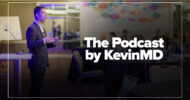 This article is sponsored by the Nuance® Dragon® Ambient eXperience, an AI-powered, voice-enabled ambient clinical intelligence (ACI) solution that automatically documents patient encounters at the point of care.
This article is sponsored by the Nuance® Dragon® Ambient eXperience, an AI-powered, voice-enabled ambient clinical intelligence (ACI) solution that automatically documents patient encounters at the point of care.
Nuance Communications, Inc., now part of Microsoft, is a technology pioneer with market leadership in conversational AI and ambient clinical intelligence solutions such as Dragon Medical One and Dragon Ambient eXperience that amplify people’s ability to help others.
Burnout has long been an issue that has plagued frontline health care workers. The COVID pandemic has increased burnout both in its intensity and scale, with more physicians reporting feelings of burnout. Pre-pandemic, 42 percent of physicians said they were burned out, and 64 percent said it has intensified due to the pandemic. Unfortunately, with a growing physician shortage (90K predicted by 2025) and an aging population (83.7M people 65 years or older by 2050), the problem is expected to persist. Burnout has had a negative impact on clinician well-being and satisfaction. But there’s much that can be done to offset the problem. AI-driven technologies, such as ambient clinical intelligence, can dramatically decrease administrative burdens to restore quality of life and the joy of practicing medicine while improving care delivery.
What is ambient clinical intelligence?
Ambient intelligence (AmI) augments human capabilities to make our lives easier, and it is becoming more pervasive in our homes and workplaces. The applications are many, especially in health care. In health care, a type of AmI, ambient clinical intelligence (ACI), is used to efficiently diagnose and monitor patients, detect and predict illness, accelerate drug development, improve the patient experience, and expand access to care. The technology is providing time savings, and that time savings is having a significant impact on operational efficiencies and improved experiences for all.
How ACI for documentation helps
It is no surprise that Medscape’s burnout and depression report cited “too many bureaucratic tasks” as the leading cause of clinician burnout. Especially when you consider that for every hour of patient care, two hours are spent documenting it. The administrative burdens of managing patient care and meeting increasing compliance and documentation requirements frustrate clinicians and interfere with their ability to practice medicine.
The Nuance® Dragon® Ambient eXperience™, or DAX™ for short, is an AI-powered, voice-enabled ACI solution that automatically documents patient encounters accurately and efficiently at the point of care. For use in office and telehealth settings, in all ambulatory specialties, including primary and urgent care, DAX enhances the quality of care and the patient experience while increasing clinician efficiency and satisfaction. DAX captures the patient-clinician conversation, and deep-learning-based AI automatically converts encounter conversations into medical documentation tailored to each specialty. Simply said, DAX is clinical documentation that writes itself™ – and delivers significant outcomes.
In a Nuance survey, DAX clinicians reported time savings of 7 minutes per encounter, reducing documentation time by 50 percent, which many organizations are using to see 3 to 5 more patients on average per day. Clinicians also reported a 70 percent reduction in feelings of burnout and fatigue. Patients are benefiting too. In fact, 83 percent say their physician is more personable and conversational, and 81 percent say their physician is more focused since using DAX.
Reducing burnout and improving patient care
Dr. Alfred Atanda, a pediatric orthopedic surgeon at Nemours Children’s Hospital in Delaware, has firsthand experience with burnout: “So many of us physicians spend so much of our time doing other things [beyond patient care] that are not of true value to us, and over time, it erodes you, little by little.” His number one concern outside patient care is documentation: “Notes take time, and they are tedious – it’s a direct correlate to burnout in large health care settings.”
Since using Nuance DAX in his practice, Dr. Atanda and his care team have felt relief from some of those administrative burdens – allowing them to be a more efficient team while connecting and bonding more deeply with their patients.
DAX ensures the primary focus of each visit is the patient and their story, not notetaking or documentation. That strengthens the patient-physician relationship and increases patient satisfaction, engagement, and retention. It brings providers back to what attracted them to medicine in the first place. And it removes the heart-sinking feeling of getting to the end of clinic time and seeing hours of documentation tasks ahead.
A glimpse into the not-too-distant future
This is just the beginning of the benefits DAX can bring. Over time, DAX will open an entire clinical intelligence ecosystem fueled by different AI algorithms that can spot indicators of depression, anxiety, and social determinants of health, which can be selected and seamlessly deployed to clinical teams at the point of care to solve complex operational and clinical challenges. The potential applications are almost limitless, but one thing is certain: this technology will change the experience of care for physicians and patients and help both groups lead happier, healthier lives.
Discover how Nuance DAX can help you reduce burnout and improve patient experiences in your practice.
VISIT SPONSOR → https://nuance.com/exploreDAX
SUBSCRIBE TO THE PODCAST → https://kevinmd.com/podcast
RATE AND REVIEW → https://kevinmd.com/rate
FOLLOW ON INSTAGRAM → https://www.instagram.com/kevinphomd
FOLLOW ON TIKTOK → https://www.tiktok.com/@kevinphomd

























